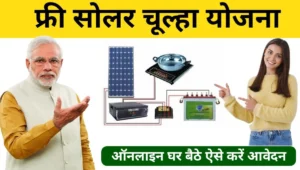The Free Solar Chulha Yojana 2025 is a revolutionary initiative aimed at promoting sustainable and eco-friendly cooking solutions across India. This scheme, launched by the Government of India, seeks to distribute free solar-powered cookstoves (chulhas) to households, particularly in rural and underserved areas. This article delves into the details of the scheme, its benefits, and its impact on society.
The Need for Sustainable Cooking Solutions
Traditional cooking methods, such as using firewood or kerosene, contribute significantly to environmental pollution. They release harmful greenhouse gases and particulate matter, contributing to climate change and health issues.

The smoke generated from traditional cooking fuels is a major health hazard, leading to respiratory illnesses and other health problems, especially among women and children who spend significant time near the cooking area.
Rural households often spend a substantial portion of their income on cooking fuels. The Free Solar Chulha Yojana aims to alleviate this economic burden by providing a cost-free, renewable energy solution.
Overview of Free Solar Chulha Yojana 2025
- Promote Clean Energy: Encourage using solar energy for cooking, reducing dependence on traditional fuels.
- Improve Public Health: Mitigate health risks associated with smoke from traditional cookstoves.
- Economic Relief: Provide financial relief to low-income households by eliminating the cost of cooking fuel.
- Environmental Protection: Reduce carbon emissions and promote sustainable living.
Key Features
- Free Distribution: Eligible households receive solar chulhas at no cost.
- Wide Coverage: The scheme targets rural and remote areas where access to clean energy is limited.
- Technical Support: Beneficiaries receive training and support to ensure proper use and maintenance of the solar chulhas.
- Monitoring and Evaluation: Regular monitoring assesses the scheme’s impact and efficiency.
How Solar Chulhas Work
Solar chulhas utilize solar panels to convert sunlight into electricity, which powers the cooking appliance. They are designed to store energy during non-sunny periods, ensuring continuous availability.
- Solar Panels: Capture and convert sunlight into electricity.
- Battery Storage: Stores energy for use when sunlight is not available.
- Induction Cooktop or Heating Element: Uses stored solar energy for cooking.
- Control Unit: Regulates the flow of electricity and ensures efficient energy usage.
Implementation of Free Solar Chulha Yojana 2025
- Rural Households: Priority is given to rural and remote areas with limited access to clean energy.
- Low-Income Families: Households below a certain income threshold are eligible for free distribution.
- Women-Led Households: Special consideration is given to households led by women, promoting gender equity.
- Registration: Eligible households can register through local government offices or online portals.
- Verification: Applicants undergo a verification process to ensure eligibility.
- Distribution: Verified beneficiaries receive their solar chulhas through designated distribution centers.
Benefits of the Free Solar Chulha Yojana
- Reduced Emissions: Solar chulhas produce no emissions, significantly reducing the household carbon footprint.
- Conservation of Forests: Reduces the need for firewood, helping to preserve forest ecosystems.
- Improved Air Quality: Eliminates indoor air pollution caused by traditional cookstoves.
- Lower Health Risks: Reduces the incidence of respiratory and eye diseases among household members.
- Cost Savings: Households save money on cooking fuels, increasing their disposable income.
- Energy Independence: Reduces dependence on non-renewable energy sources.
- Empowerment of Women: Eases the burden on women who typically manage household cooking, allowing them more time for other activities.
- Community Development: Promotes the use of modern technology in rural areas, fostering community development and education.
Challenges and Solutions
- Maintenance: Ensuring proper maintenance and longevity of solar chulhas can be challenging.
- Solution: Provide comprehensive training and support to beneficiaries.
- Funding: Sustaining the financial requirements for large-scale distribution.
- Solution: Secure funding through government budgets, partnerships with NGOs, and international aid.
- Adoption: Convincing households to switch from traditional methods to solar chulhas.
- Solution: Conduct awareness campaigns and demonstrations showcasing the benefits of solar chulhas.
Expert Insights
“Solar chulhas represent a pivotal shift towards sustainable and healthy cooking practices. Their widespread adoption can lead to substantial environmental and health benefits.” – Dr. Anjali Sharma, Environmental Scientist.
“The Free Solar Chulha Yojana is a testament to India’s commitment to sustainable development. It aligns with our goals of reducing poverty and promoting clean energy.” – Mr. Rajesh Verma, Policy Advisor.
Ongoing research aims to improve the efficiency and affordability of solar chulhas, making them accessible to a larger population.
Conclusion
The Free Solar Chulha Yojana 2025 is a groundbreaking initiative that addresses multiple challenges simultaneously – environmental protection, health improvement, and economic relief. By promoting the use of solar chulhas, the scheme paves the way for a sustainable and healthy future for millions of households across India.
FAQs
What is the Free Solar Chulha Yojana 2025?
The Free Solar Chulha Yojana 2025 is a government initiative to provide free solar-powered cookstoves to households, primarily in rural and underserved areas.
How do solar chulhas work?
Solar chulhas use solar panels to convert sunlight into electricity, which powers the cooking appliance. They store energy for use during non-sunny periods.
Who is eligible for the Free Solar Chulha Yojana?
The scheme targets rural households, low-income families, and women-led households. Eligibility criteria include income thresholds and residency in rural or remote areas.
What are the benefits of using solar chulhas?
Benefits include reduced environmental pollution, improved health outcomes, cost savings on cooking fuels, and empowerment of women.
How can I apply for the Free Solar Chulha Yojana?
Eligible households can apply through local government offices or online portals. The application process includes registration, verification, and distribution.